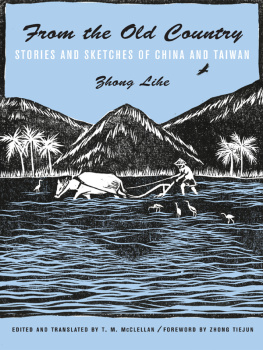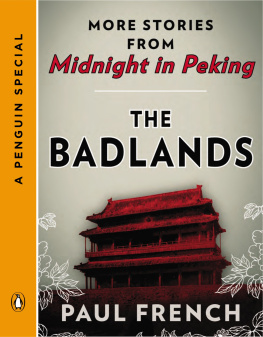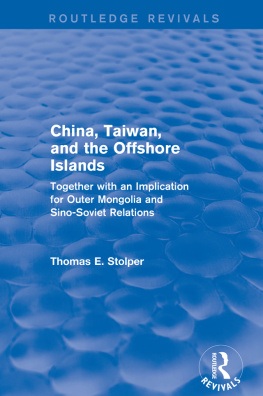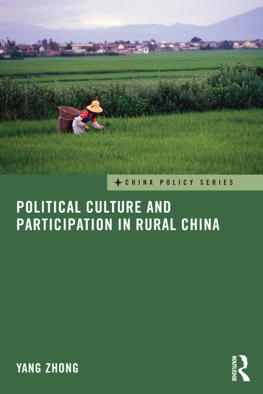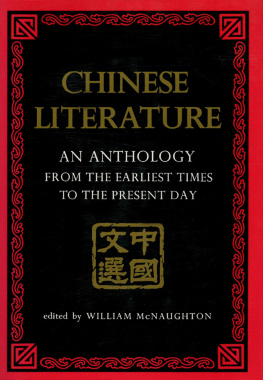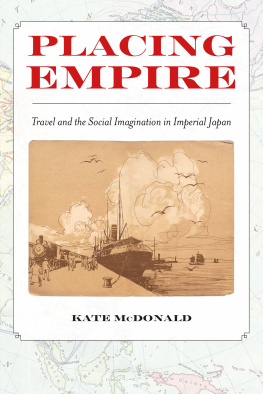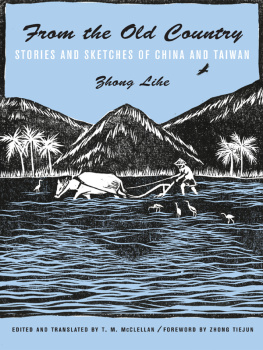MODERN CHINESE LITERATURE FROM TAIWAN
From the Old Country
MODERN CHINESE LITERATURE FROM TAIWAN
EDITORIAL BOARD
PANG-YUAN CHI
GRAN MALMQVIST
DAVID DER-WEI WANG, COORDINATOR
Wang Chen-ho, Rose, Rose, I Love You
Cheng Ching-wen, Three-Legged Horse
Chu Tien-wen, Notes of a Desolate Man
Hsiao Li-hung, A Thousand Moons on a Thousand Rivers
Chang Ta-chun, Wild Kids: Two Novels About Growing Up
Michelle Yeh and N. G. D. Malmqvist, editors, Frontier Taiwan: An Anthology of Modern Chinese Poetry
Li Qiao, Wintry Night
Huang Chun-ming, The Taste of Apples
Chang Hsi-kuo, The City Trilogy: Five Jade Disks, Defenders of the Dragon City, Tale of a Feather
Li Yung-ping, Retribution: The Jiling Chronicles
Shih Shu-ching, City of the Queen: A Novel of Colonial Hong Kong
Wu Zhuoliu, Orphan of Asia
Ping Lu, Love and Revolution: A Novel About Song Qingling and Sun Yat-sen
Zhang Guixing, My South Seas Sleeping Beauty: A Tale of Memory and Longing
Chu Tien-hsin, The Old Capital: A Novel of Taipei
Guo Songfen, Running Mother and Other Stories
Huang Fan, Zero and Other Fictions
From the Old Country
Stories and Sketches of China and Taiwan
Zhong Lihe
EDITED AND TRANSLATED BY T. M. MCCLELLAN
FOREWORD BY ZHONG TIEJUN
COLUMBIA UNIVERSITY PRESS NEW YORK
Columbia University Press
Publishers Since 1893
New York Chichester, West Sussex
cup.columbia.edu
Copyright 2014 Columbia University Press
All rights reserved
E-ISBN 978-0-231-53649-3
Columbia University Press wishes to express its appreciation for assistance given by the Chiang Ching-kuo Foundation for International Scholarly Exchange and Council for Cultural Affairs in the publication of this series.
Library of Congress Cataloging-in-Publication Data
Zhong, Lihe, 19151960.
[Works. Selections. English]
From the old country : stories and sketches of China and Taiwan / Zhong Lihe; edited and translated by T. M. McClellan; foreword by Zhong Tiejun.
pages cm. (Modern Chinese Literature from Taiwan)
Includes bibliographical references.
ISBN 978-0-231-16630-0 (cloth : acid-free paper) ISBN 978-0-231-53649-3 (e-book) 1. Chinese literature20th centuryTranslations into English. I. McClellan, T. M. (Thomas Michael) translator. II. Title.
PL2757.L5A2 2014
895.1351dc23
2013022554
A Columbia University Press E-book.
CUP would be pleased to hear about your reading experience with this e-book at .
JACKET ART: ZHONG SYUNWEN
References to websites (URLs) were accurate at the time of writing. Neither the author nor Columbia University Press is responsible for URLs that may have expired or changed since the manuscript was prepared.
CONTENTS
The movie China: My Native Land (1980) was a biopic of my father, Zhong Lihe. Without an iron will, nobody could have persevered in his ideals from start to finish, against poverty and illness, as thoroughly as he did, as seen in the movie. My father was a writer who stuck to his principles and never ceased to plow the literary field. His final, fatal, attack of tuberculosis came while he was in the act of revising his newest literary work, so that he has been dubbed a writer who died, pen in hand, in a pool of his own blood. The volume of short fiction, Oleander, printed in Peking in 1945, was the only book Zhong Lihe saw published in his lifetime; his only completed full-length novel, Songs of Bamboo Hat Hill, won Taiwans top prize for long fiction in 1956; his other works include the four-part novella Homeland. The year 2009 saw the publication of the eight-volume New Complete Works of Zhong Lihe.
A literary vocation is an extremely hard career. For Zhong Lihe it was all the more so because his golden age as a writer coincided with the period in postwar Taiwan when anti-communist imperatives held sway. The true-to-life descriptions of the land, the people, everyday life, and various intricate social phenomena that dominated Zhong Lihes works were pigeonholed as nativist literature. Naturally, most of his work never saw the light of day; even more naturally, there was no question of his being able to live by his pen. However, Zhong Lihe always believed that true worth would out; good literature could not be allowed to languish in obscurity. And so it has proved! Half a century has gone by, and at last my fathers high place in literary history has been confirmed. Here in Meinong, where Zhong Lihe lived and wrote and fell in love, the Zhong Lihe Memorial Institute, Taiwans first such institution to be funded in the community, was built in 1983; and before long, Taiwans first Zhong Lihe literary eco-park will also start to take shape here at the foot of Bamboo Hat Hill.
It may be said that Zhong Lihe gave his life for his literature, but it has also been said that it was Zhong Pingmei (Taimei) who brought out the literature in him, and without Zhong Pingmei there would have been no literature. Zhong Lihes wife, my mother Zhong Taimei, was the epitome of the virtuous woman: she adored her family, loved her husband, and was devoted to us children. She was friendly, meek, and warm toward others. During her husbands long, recurrent illnesses she steadfastly bore the brunt of family duties and family economics on her own slender shoulders. She could do the work of any maneven the arduous and dangerous job of illegal logging. Pingmei (the name my father usually used for fictional portrayals of her) never questioned her fate and was surely a heroine among Hakka women. And now, it is extremely fitting that the bridge that links the Zhong Lihe Memorial Institute to the rest of the world has been rebuilt and renamed as Pingmei Bridge, because in life and death Zhong Lihe and Zhong Taimei could never be separated by the swiftest of torrents or the widest of rivers.
On August 4, 1960, Zhong Lihe was in the act of carrying out revisions to his newly completed novella Rain when tuberculosis struck again. Coughing up blood, he collapsed onto his manuscript and died at the age of forty-four. To have lived such a short time on earth, yet to achieve such a lofty posthumous reputation must be due not only to the authors own noble and steadfast character, but even more to the truth, goodness, and beauty of human nature that his literature expresses, and to the honesty, detail, and warmth of his writing. When we read his work we sense an elegant melancholy, but no plaintiveness; it conveys a profoundly tolerant attitude to Heaven, to Fate, and to the harshness of Time. Throughout his writings we find rationalism coupled with ardor and a fervent love of life. Even though Zhongs typical subjects were the most ordinary and humble of rural people living the harshest, most basic of lives, he shows how tenaciously they struggle with themselves, with poverty. In their unrelenting struggle readers may clearly sense the nobility and dignity of human nature. Opportunists and waverers carry no weight in his literature: he felt a mixture of sadness, pity, and disgust for characters such as Li Xinchang in Swimming and Sinking. Zhong believed that human beings should live their lives with dignity, should fight for life. He revered those who lived courageously and conscientiously, and part of his reason for writing was to eulogize them. As society grows ever more utilitarian, Zhong Lihes works appear all the more pure and moving.

